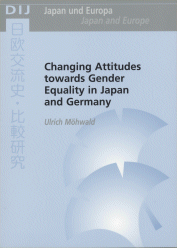
Details
2002, ISBN 3-89129-870-6, € 14,00, iudicium Verlag, Munich, 148 p., kt. [Order]Authors
Changing Attitudes towards Gender Equality in Japan and Germany

The paper deals with the change and structure of attitudes concerning gender roles and gender equality in Japan and Germany after World War II. Examining the Japanese case gives us insight into long-term processes of change in gender-related attitudes in highly industrialized societies, because gender-related attitudes have long been the subject of opinion polls, with cross-sectional data for the late 1940s and early 1950s, and time series data since the early 1970s. Nevertheless, in the case of Japan, we have to take into account a number of peculiarities that set her apart from other highly industrialized societies. It is common wisdom that Japanese modernization proceeded from economic, political, social, moral and religious traditions that were quite different from the Western ones, and that have still strongly persisted well into the post-World War II era. We therefore might expect considerable variation if we compare the development of gender-related attitudes in Japan with that in Western societies. Such a comparison is attempted in this paper with Germany.
The approach adopted in this paper is strictly exploratory. It mainly deals with the exploration of patterns of gender-role attitudes and values on the micro level. Its aim is to understand the processes of change in the two societies as well as the similarities and differences between them based on the interpretation of empirical evidence. Of particular interest are combinations and mixtures of attitudes and values related to gender roles by various population subgroups and the features of these subgroups. In order to gain a broader understanding of the processes of change of gender-related values and attitudes, it first analyzes the long-term development of gender-role attitudes in postwar Japan based on the results of various Japanese opinion polls. Then it undertakes an analysis of the items related to gender equality in the 1991 survey from the German Institute for Japanese Studies. The fourth section deals with the development and structure of gender-role attitudes in Germany, mainly based on the data from the German General Social Survey and the 1988 ISSP Survey on ‘Family and Changing Gender Roles’. Finally, it compares Japanese, West German and East German gender-role consciousness, based on the German and Japanese data of the 1994 ISSP Survey.